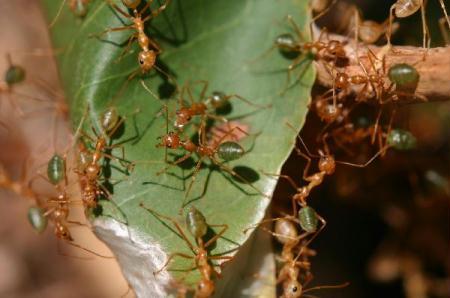Weaver ants to help African farms yield fruit
EATING
The project also has an unexpected - and tasty- side benefit.
 |
|
File photo provided by Aarhus University shows weaver ants in close-up, in the foliage of tree.[Xinhua] |
Weaver ant queens, the reproductive females in an ant colony, and weaver ant larvae, which are the immature ants, have a soft, slightly sweet taste and is rich in protein. In Thailand and elsewhere Southeast Asia, the ants have been served as a traditional delicacy.
"We are actually turning pests into edible protein," said Joachim Offenberg, a senior scientist affiliated with the National Environmental Research Institute, Denmark. He has been researching on the agricultural and nutritional applications of weaver ants in Thailand for years.
"The ants eat pests in plantations, and surplus ant larvae can be harvested sustainably without destroying the ant population and their bio-control services," Offenberg told Xinhua in an email.
He said although weaver ants and their larvae have traditionally been harvested for food in Thailand, this has not harmed ant population or colonies. "On the contrary, more worker ants - the caste that hunts pest insects - developed in harvested ant colonies."
This means that weaver ants can both increase fruit production by destroying fruit flies and other pests, and at the same time serve as a sustainable source of protein for human beings.
Offenberg also points out that the natural habitat of the weaver ant, straddling the Equator in Asia, Africa and Australia, overlaps places where most of the world's one billion chronically undernourished people live.
"Protein is highly needed in Africa, where the average intake is very low," he observed. "Introducing this method in Africa will provide Africans with better fruit quality, allowing export and cash earnings, and at the same time provide rural people with a protein source."
 0
0 







Go to Forum >>0 Comments